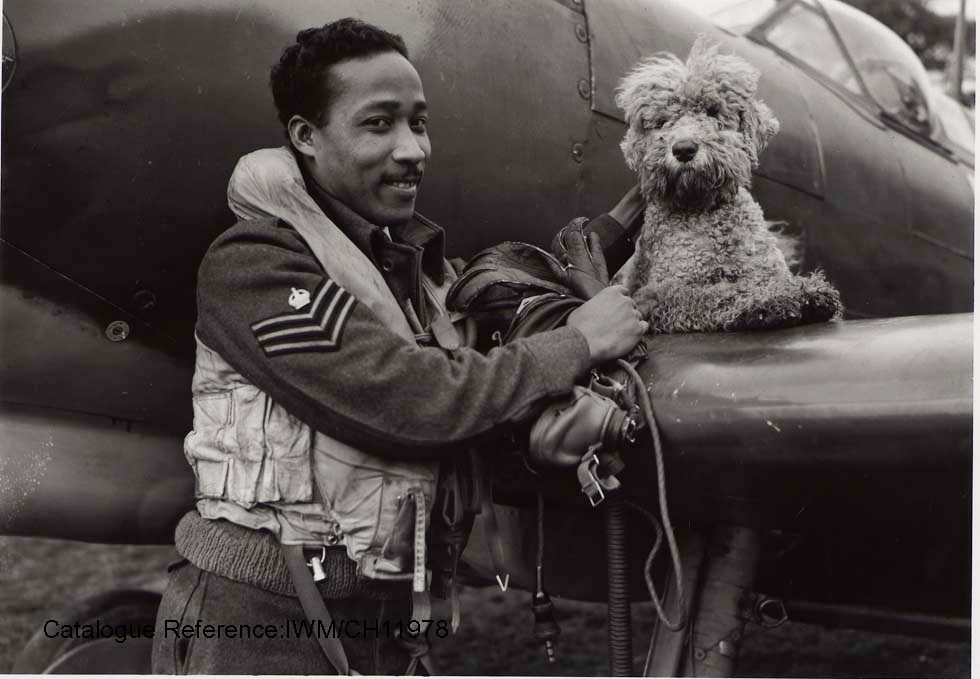Des Caribéens dans la RAF
Une fois n'est pas coutume , je vais vous présenter ici un sujet vraiment peu abordé , il s'agit des pilotes issus des caraibes ayant servi dans la Royal Air Force durant la Seconde Guerre Mondiale .
A la vue de la rareté du sujet des informations en Français n'existent tout simplement pas , que l'on m'excuse pour la barrière de la langue ( si quelqu'un se porte volontaire pour traduire je suis toute ouie ) .
Bonne lecture !
A group of Caribbean organisations in America are planning a documentary with the title Caribbean Glory which will detail the contributions of the British West Indian military in the building of the modern English speaking Caribbean.
It is 1943 and London is still ringed by anti-aircraft batteries and barrage balloons to ward off attacking enemy aircraft. Below the grey skies of that embattled city, a BBC camera crew follows a young black man in Royal Air Force (RAF) uniform. With a quickstep and purposeful stride, he enters a building for the filming of a documentary ‘West Indies Calling’.
His name is Phillip Louis Ulric Cross, a Trinidadian, navigator and bomb-aimer in 139 (Jamaica) Squadron. Cross, the only person of color in his unit, later became a Squadron Leader and completed 80 missions over occupied Europe and Germany.
He was one of 7,000 West Indian volunteers in the RAF. Of that number, about 440 were aircrew including Fight Lieutenant Cy Grant of British Guiana whose bomber was shot down over Holland in 1943, and Flight Lieutenant Dudley Thomson of Jamaica who also flew in Lancaster bombers.
These West Indians had rushed to the defense of Britain, their ‘Mother Country’ during that time, when she was under assault by Nazi Germany. The story of these brave West Indians in the Royal Air Force is only now being told.
Though they preceded their US allies of the now legendary African American Tuskegee Airmen in combat, the story of these valiant British West Indians who also flew, is only not very well known. Unfortunately, most of those pioneers who flew in the skies over Europe to ensure a victory for human dignity and freedom are gone.

Flight Sergeant James Hyde of San Juan, Trinidad, a Spitfire pilot who arrived in Britain in 1942 to begin his training, here pictured in 1944 with his Squadron’s mascot, a dog called ‘Dingo’. He is wearing a life jacket, known universally as a Mae West, and is holding an oxygen mask and his flying gloves. Most air battles took place at altitudes in excess of 15,000 feet (c. 5000 metres) and oxygen and thermal protection were vital. [Source: www.movinghere.org.uk - Imperial War Museum (IWM) Reference CH11978]
http://www.caribbeanaircrew-ww2.com
A la vue de la rareté du sujet des informations en Français n'existent tout simplement pas , que l'on m'excuse pour la barrière de la langue ( si quelqu'un se porte volontaire pour traduire je suis toute ouie ) .
Bonne lecture !
A group of Caribbean organisations in America are planning a documentary with the title Caribbean Glory which will detail the contributions of the British West Indian military in the building of the modern English speaking Caribbean.
It is 1943 and London is still ringed by anti-aircraft batteries and barrage balloons to ward off attacking enemy aircraft. Below the grey skies of that embattled city, a BBC camera crew follows a young black man in Royal Air Force (RAF) uniform. With a quickstep and purposeful stride, he enters a building for the filming of a documentary ‘West Indies Calling’.
His name is Phillip Louis Ulric Cross, a Trinidadian, navigator and bomb-aimer in 139 (Jamaica) Squadron. Cross, the only person of color in his unit, later became a Squadron Leader and completed 80 missions over occupied Europe and Germany.
He was one of 7,000 West Indian volunteers in the RAF. Of that number, about 440 were aircrew including Fight Lieutenant Cy Grant of British Guiana whose bomber was shot down over Holland in 1943, and Flight Lieutenant Dudley Thomson of Jamaica who also flew in Lancaster bombers.
These West Indians had rushed to the defense of Britain, their ‘Mother Country’ during that time, when she was under assault by Nazi Germany. The story of these brave West Indians in the Royal Air Force is only now being told.
Though they preceded their US allies of the now legendary African American Tuskegee Airmen in combat, the story of these valiant British West Indians who also flew, is only not very well known. Unfortunately, most of those pioneers who flew in the skies over Europe to ensure a victory for human dignity and freedom are gone.

Flight Sergeant James Hyde of San Juan, Trinidad, a Spitfire pilot who arrived in Britain in 1942 to begin his training, here pictured in 1944 with his Squadron’s mascot, a dog called ‘Dingo’. He is wearing a life jacket, known universally as a Mae West, and is holding an oxygen mask and his flying gloves. Most air battles took place at altitudes in excess of 15,000 feet (c. 5000 metres) and oxygen and thermal protection were vital. [Source: www.movinghere.org.uk - Imperial War Museum (IWM) Reference CH11978]
http://www.caribbeanaircrew-ww2.com